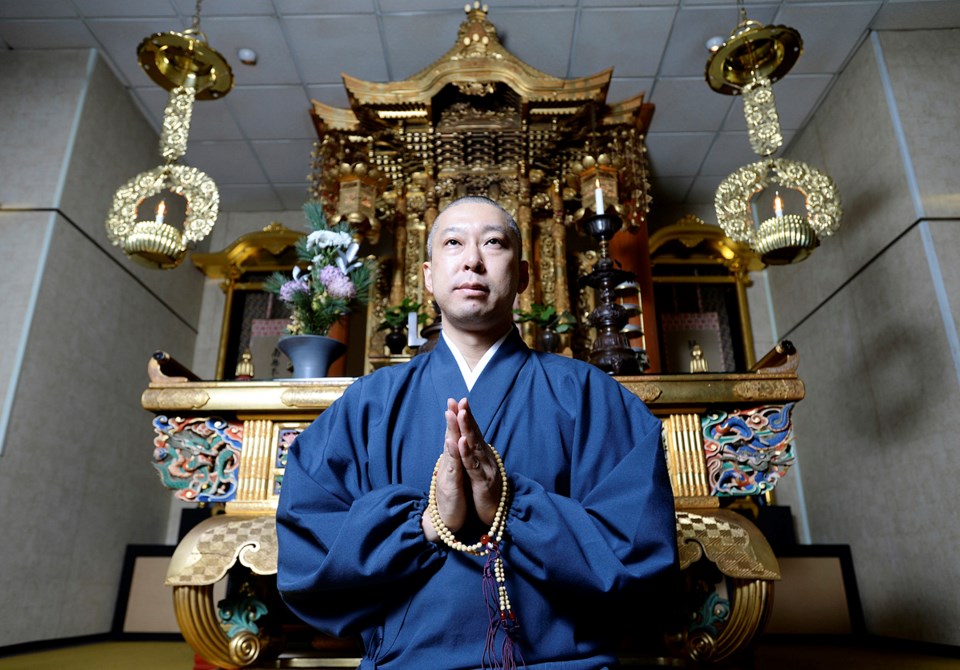New Year’s Eve will see some of us engaged in a hedonistic bacchanal.
The more laid-back among us might spend hour after hour watching Anderson Cooper giggle his way into the new year. For quite a number of Buddhists in Vancouver, the evening will be far more quiet and reflective.
The more laid-back among us might spend hour after hour watching Anderson Cooper giggle his way into the new year. For quite a number of Buddhists in Vancouver, the evening will be far more quiet and reflective.
New Year’s Eve doesn’t have a particular religious significance in Buddhism. But because Japanese customs follow the Western calendar, it is the end of the year and a good time to reflect, according to Rev. Tatsuya Aoki, resident minister at Vancouver Buddhist Temple in what was traditionally Japantown.
He and roughly 100 others will gather at UBC’s Asian Centre and strike a four-sided bell that was a gift from the government of Japan.
Buddhism teaches impermanence, that everything changes, he says.
“So Dec. 31, we take our busy schedule aside and we hit a bell more than 108 times,” Aoki says. The significance of the number, he says, is the teaching that there are 108 worldly passions that Buddhists strive to master or overcome.
The fading sounds of the bell’s peal is also intended to recall the transitory nature of life. The late Dr. Shotaro Iida, a UBC professor of religious studies, explained the significance of ringing the bell at the New Year.
“In Buddhist philosophy, there are 108 mental defilements,” Iida said. “It is believed that by ringing the bell 108 times on New Year’s Eve — 54 times before midnight, 54 times after — one can erase the past mental impurities and start the year new.”
Across town, at the Kadampa Meditation Centre on the East Side, resident teacher Gen Kelsang Thekchen will lead a candle-lighting and meditation service.
“Lighting a candle flame generally symbolizes wisdom, wisdom fire, so we’re kind of moving toward the next year with the determination to increase our wisdom and be more understanding in the year to come,” he says. “After we’ve lit all the candles, then I’m going to give a short talk on compassion Compassion is feeling the suffering of others and finding it unbearable… a wish to protect others from the suffering, to liberate others from their suffering and realizing the only way to do that is to free ourselves from our suffering, otherwise it’s one drowning person helping another.”
This will be followed by visualization.
“We spend some time visualizing our family, our friends, the people of Canada, the people of the world and all living beings, not only humans, and just reflect on how we all wish to be happy all the time, we all wish to be free from suffering. We all wish to be equal based on these simple wishes,” he says. “We’ll visualize the Buddha of compassion, mentally make offerings to that Buddha, make requests for all suffering to cease and for inspiration and blessings to help heal the world, heal our minds.”
If he times it just right, Thekchen laughs, the group will chant in the new year with a beautiful, common Buddhist mantra.
For Thekchen, whose tradition is a fairly modern Western Buddhist tradition based in Tibetan roots, New Year’s is a time of reflection.
“In our practice of moral discipline, at the beginning of the day, in the morning, we take certain vows and we make certain determinations, certain promises, to be more compassionate, more patient, to abandon certain negative actions, and then we try to be mindful of that throughout the day,” he says.
The beginning of a new year is similar.
“New Year’s seems to have, for many, a stronger power because you’re spending a little more time reflecting on your year and making some determinations. A lot of people make New Year’s resolutions, that sort of thing. Generally, I try to emphasize a determination to be more compassionate over the next year.”
At another local centre, Triratna Vancouver, order members and anyone who cares to join them will make a conscious decision to avoid the alcohol-fuelled highjinks of the night.
Dharmacharini Vimalasara, also called Valerie Mason-John, is the chairperson of the local order and also the author of several books, including Eight Step Recovery Using the Buddha’s teachings to Overcome Addiction.
“There are many people who struggle at this time,” she says. “We’re creating a safe space for people to come and the opportunity to reflect on their lives without being under the influence of an intoxicant.”
Lots of people choose to medicate on New Year’s Eve, she says, while she and those around her prefer to meditate.
“We will also do a ritual looking at what people would like to leave behind and what they would like to cultivate in 2016,” she says.
Even so, she downplays the relevance of Dec. 31 or Jan. 1.
“New Year’s Eve isn’t significant in our tradition, because every day is a new year,” she says. “But we are living in the West, we’re living in a Christian country where many people are affected by the new year.”
She and other Buddhists in town want people to have the opportunity to experience it in a different way.
@Pat604Johnson



